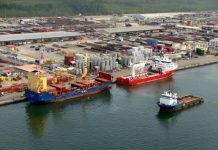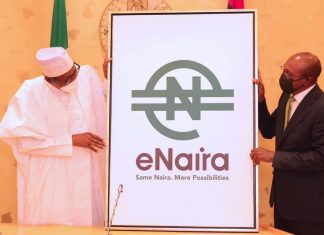Nigeria, meanwhile in Abuja, revealed continuing determination to stand against the rest of the planet from the change from fossil fuels even though a looming $13 trillion anticipated losses in earnings in addition to the radical drop in petroleum demand.
An international think-tank, Carbon Tracker, had set cumulative total earnings loss for most oil-producing states by 2040 at $13 trillion awarded the transfer from petroleum.
Lingering doubt in the oil and gas industry has pushed Nigeria to monetary catastrophe resulting in the borrowing of around $33.8 billion (N12.7 trillion) where the Federal Government owes $28.5 billion while the nations invest $4.7 billion. Extra $6 billion has been contemplated for borrowing.
The Guardian had reported that the mounting worldwide advocacy directed at stopping all-new Final Investment Choices (FIDs) for fossil fuels renders up to $150 billion worth of jobs in danger from the nation.
Even though Buhari told investors and petroleum and gas analysts in case the ambitious aim of ramping up crude petroleum production to four million barrels every day and creating a book of 40 billion barrels remain sacrosanct, evasive regulatory and legal framework, particularly the two-decade-old Petroleum Industry Bill has abandoned oil and gas projects on the drawing board since the nation overlooks Foreign Direct Investment (FDI) estimated from the National Assembly to be roughly $235 billion.
Buhari said though energy transition is actual, as renewable technology is becoming cheaper with investors getting aware of environmental problems and turning their back on hydrocarbon investments, history has demonstrated that human beings possess the stiff desire for energy.
Stressing that renewables don’t have the ability to deal with in the near future, Buhari, represented by Sylva stated: “Fossil fuels will continue to function as the origin of heaps of petrochemicals feedstock that firms will transform into flexible and closing materials for contemporary life.
“We can’t turn our back on further exploration, discovery of new subjects is essential. And we also will need to deal with short-term changes using existing technology which may prolong the life span of older fields. No one should doubt our commitment in this respect, given a daring move to issue fresh marginal fields ”
While the country’s non-oil earnings and export remained gloomy, Buhari said the nation with a huge hydrocarbon potential would exploit the possibility with plan development.
Kyari, who evaluated that the future of hydrocarbon from the sub-Saharan region banked on developing people as an elixir for additional oil. Kyari noted that the projected movement from hydrocarbon was overly extravagant, insisting that gas and oil could continue being a significant driver in vitality, particularly in Africa, which might not grow equally with different continents in transferring out of petroleum.
Kyari, however, increased concern over investment and infrastructure outlook, taking side-by-side by insisting on a greater financial regime. He sees cooperation as a crucial aspect to induce constant investment and exploration in the petroleum and gas industry.
“We all know we’ve challenges around monetary equilibrium,” Kyari stated, adding that there have been joint engagements in the industry, which had contributed to solving of litigations that could have led to the nation a good deal.
“Funding is a significant problem in the business now, for 2 reasons; yet, there is a paucity of funds throughout the world. And second, there is general hesitation by investing organizations to invest in oil-related companies.
“That is what we must live with, that which we must cope with. Clearly, the best of this company that will endure must attempt to interpret a great deal more climate favourable, friendly companies,” that the GMD noted.
Lawan said the government is dedicated to addressing regulatory and financial problems in the industry, stressing the PIB will be passed prior to the end of the month.
“Now the National Assembly, along with the authorities are working together to ensure the passing of this PIB. We believed the PIB could have been passed.”
Stressing that the present legislature embraced a collaborative method of analyzing issues from the suggestions so as to narrow down contentions that held down the invoice previously, Lawan cautioned that safety issues should be taken for granted.
Read also:COAS Appointment: Nigerian Army Retires 29 Senior Generals
He said there was a need to guarantee a peaceful small business environment, particularly in the oil-producing region to make sure that petroleum businesses operate peacefully.
Lawan explained: “We must do everything that’s essential to keep to make sure that stability and security, varied communities have to get carried along.” Gbajabiamila equally said the rate could be implemented to guarantee passage of this bill, stressing that there was a demand for Nigeria to bring investment.
He voiced concern on the future of this business, noting that Nigeria has to make haste to research its hydrocarbon resources. “We’ve decided to find the PIB right now moment,” he said.
Secretary-General of OPEC, Mohammad Sanusi Barkindo, that increased concern over insecurity in the nation, which he said took collective attempts noted that the nation was in a position to handle recent financial shocks.
Recalling the 2016 oil cost shortfall and the huge consequences of the oil glut resulting in the 2020-21 downturn, Barkindo said the catastrophic spread of COVID-19 severely affected international petroleum demand and, exposing growing markets like Nigeria.
He explained: “Since the world market contracted by 3.5 per cent year-over-year in 2020, global oil demand dropped by 9.5 mb/d. And President Buhari and his Government rose to these two fantastic challenges.
Speaking on action taken by OPEC to keep the market in equilibrium, Barkindo stated conformity into the production alterations was 114 per cent in April 2021. According to the worldwide market, oil market principles and the petroleum demand outlook have been supported by favourable information on vaccine rollouts and also the ongoing massive fiscal stimulus that’s forcing the economic collapse.
To him, the ongoing large number of COVID-19 instances in certain countries; the jagged vaccine rollout, especially when studying the developed versus the developing world; virus mutations; an orderly and clear return of provides to the worldwide marketplace; inflationary pressures; along with central bank answers, create a concern to the industry.
Stating that gas could eventually become dominant in energy combination, Sentyurin noted that the share of gasoline at energy combination could move to 28 per cent from present 23 from 2050.
Join Television Nigerian Whatsapp Now
Join Television Nigerian Facebook Now
Join Television Nigerian Twitter Now
Join Television Nigerian YouTUbe Now





